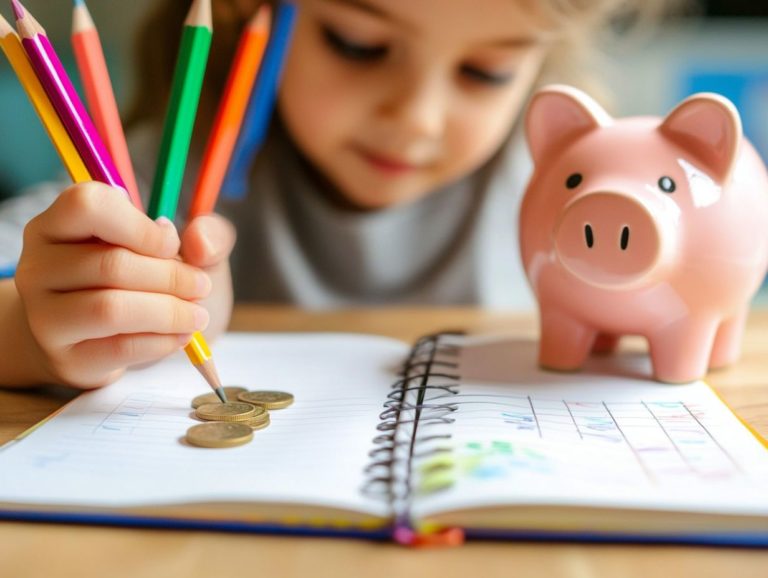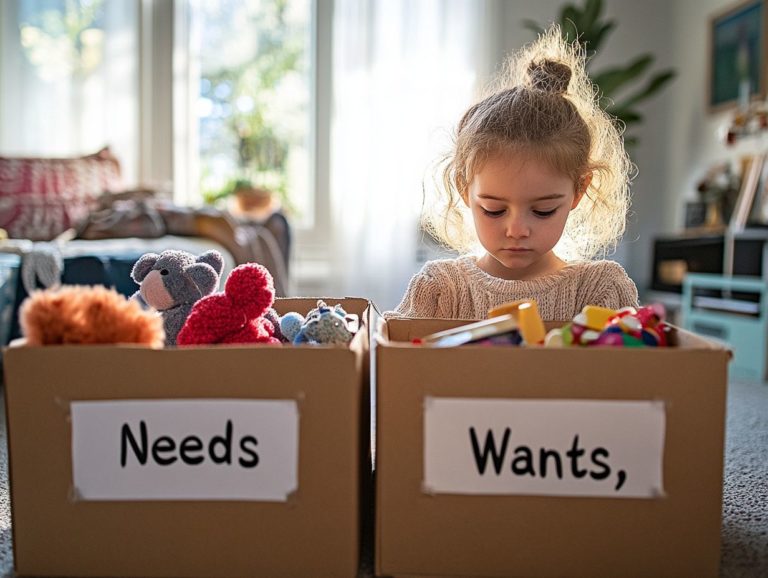What Role Does Giving Back Play in Kid-Focused Financial Education?

Neale Godfrey is the financial voice for women and multi-generations and a world-renowned speaker and author, who has inspired millions through her work. She motivates, trains, educates, and frankly, entertains by delivering her core message: Empower yourself to take control of your financial life.
In the fast-moving world of finance, teaching children about financial literacy is more crucial than ever.
Understanding money management at a young age lays the groundwork for responsible financial habits that can last a lifetime.
Financial education is more than managing money; it includes important values such as generosity and social responsibility.
This article looks at the importance of financial education for children, the transformative role of giving back, and practical methods to teach these lessons to their children, helping them manage money wisely and compassionate individuals.
Key Takeaways:
The Importance of Financial Education for Children

Teaching kids about money is a key part of growing up. It provides them with the skills they need to manage money throughout their lives.
When kids learn about money, they understand its worth and learn to make wise choices. Parents can help by explaining things like budgeting, saving, and spending in ways that suit their age. For a deeper look into how financial literacy impacts broader societal issues, the National Education Association (NEA) offers compelling insights into financial literacy and economic inequality.
When parents are involved in these lessons, it creates a setting where kids can learn to handle money in daily life, helping them become independent and successful with their finances as they mature. One of our most insightful case studies elaborates on how teaching kids to save and track money can significantly enhance their financial literacy.
Why is it Important to Teach Children About Finances?
Teaching kids about money is important because it helps them learn how to manage money well when they grow up.
Teaching kids important financial ideas early helps them learn how to manage money and think critically about financial problems.
This proactive approach can promote healthier spending habits and encourage saving, instilling a sense of responsibility that they will carry into adulthood.
Parents being involved is important in this process. Talking about allowances, budget planning, and goals helps parents show good money skills.
This helps children feel sure about making good financial decisions, which results in a generation that knows more about handling their money.
What are the Benefits of Financial Education for Children?
Teaching children about money is very important because it helps them become responsible and develop long-lasting financial habits.
By teaching them about managing money, young students get better at creating budgets, helping them manage their money well. This basic knowledge encourages better saving habits, helping them set and achieve financial goals.
These skills help children learn how to make sensible decisions about using money. They learn to distinguish between necessities and desires. When they manage their money with more care, they understand why it is important to wait for rewards to improve their financial well-being later on.
Such an early introduction to financial concepts paves the way for a lifetime of informed money management, positively impacting their adult lives. According to Edutopia, teaching kids to manage money can yield significant long-term benefits. To further empower young learners, [exploring various methods and impacts on youth financial literacy](https://breadbox.money/kids-finance-education-platform/interactive-learning/money-management-activities/youth-financial-literacy-impact/) can significantly enhance their understanding and application of financial concepts.
The Role of Giving Back in Financial Education for Children
Teaching kids to give back as part of financial lessons helps them learn about money, caring for others, and responsible spending.
When children donate to charity, they learn the value of giving and making careful financial decisions. This lesson strengthens habits that can lead to a more caring and responsible adult.
By showing kids the benefits of donating and being active in their community, parents can build a sense of responsibility that goes well with their financial learning. According to Psychology Today, fostering altruism in children not only enhances their financial understanding but also produces happier and more empowered individuals, highlighting the comprehensive benefits of charitable involvement. To further develop these skills, parents can introduce activities that emphasize money management principles, as detailed in our guide on Financial Literacy for Kids: Benefits and Activities.
How Does Giving Back Teach Children About Finances?
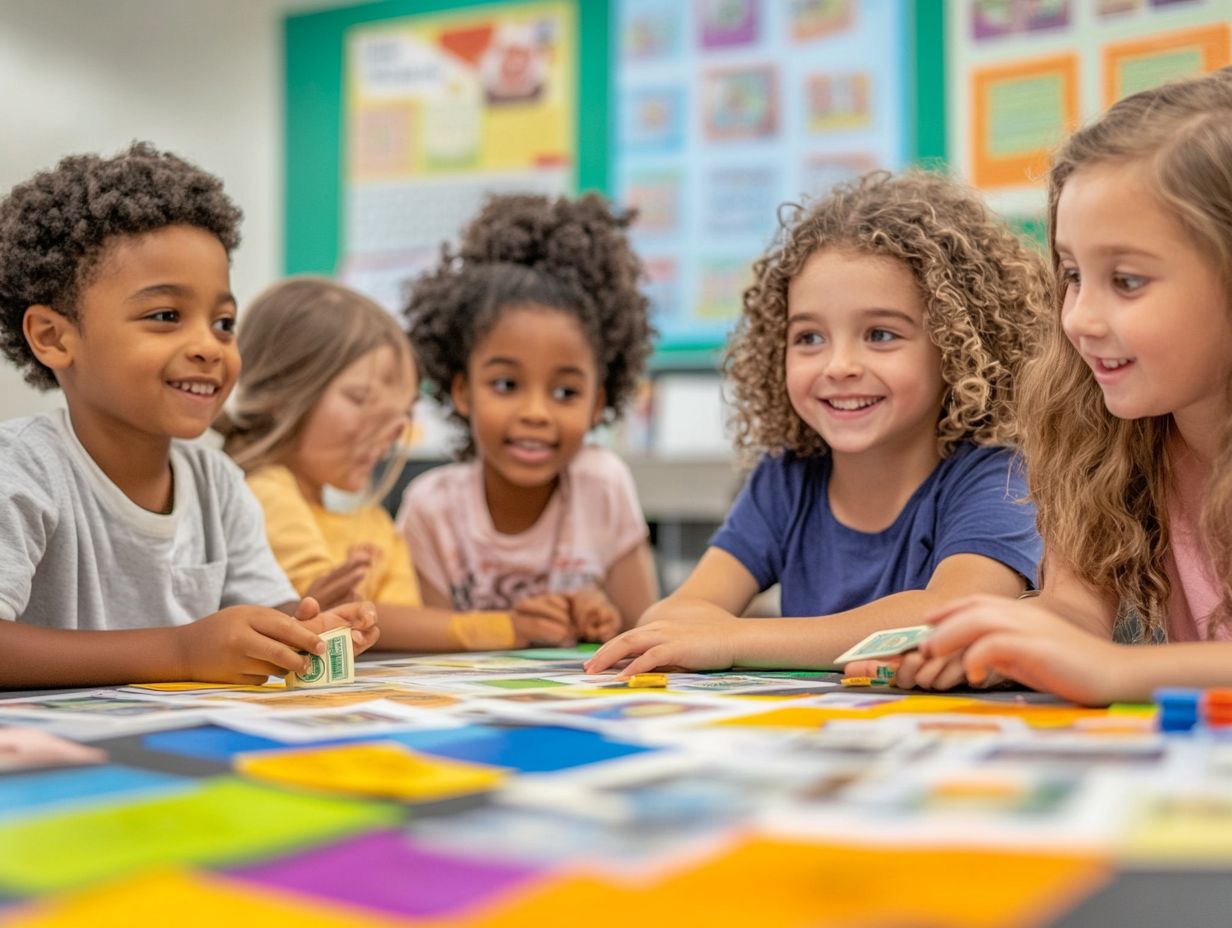
Giving back teaches children about finances by demonstrating the practical applications of money management through charitable giving and community involvement.
When participating in these activities, children can gain important knowledge about handling money for donations. They can figure out how to set aside some of their allowance or money they earn for giving to charity. This helps them learn how to handle money and makes them more empathetic when they see how their donations benefit others.
When kids take part in charity work, they learn more about money issues in their community, which helps them understand financial education better. These experiences encourage thoughtful financial decisions that extend beyond personal gain, instilling a lifelong value of generosity and responsible spending.
What are the Benefits of Incorporating Giving Back in Financial Education?
Adding lessons about giving back in financial education has many advantages, like teaching empathy, helping children become responsible, and encouraging better financial habits.
When children are taught the importance of charitable giving, they begin to understand the value of money beyond just personal gain. This practice helps them develop empathy for others and teaches them to be responsible members of their community.
When young people help others, they learn about money problems that others face. This can help them make financial decisions in the future. By teaching ideas about charity in financial education, they develop an attitude that focuses on helping others, resulting in more responsible consumers and philanthropists down the road.
Ways to Include Charitable Lessons in Children’s Financial Education
Including charitable activities in children’s financial education can be done in different ways, teaching kids practical money skills and encouraging community involvement.
1. Donating to Charities
Donating to charities is one of the most impactful ways to teach kids about financial education and the importance of sharing money.
When children give to charity, they learn how to handle their money and understand saving some for helping others. This practical method teaches important lessons about budgeting, as they decide how much to donate while learning about the financial effects of their decisions.
This practice helps children understand what others are going through and the importance of being kind in society. Through this combined experience, kids learn about managing their money and the value of supporting others.
2. Volunteering at Non-Profit Organizations
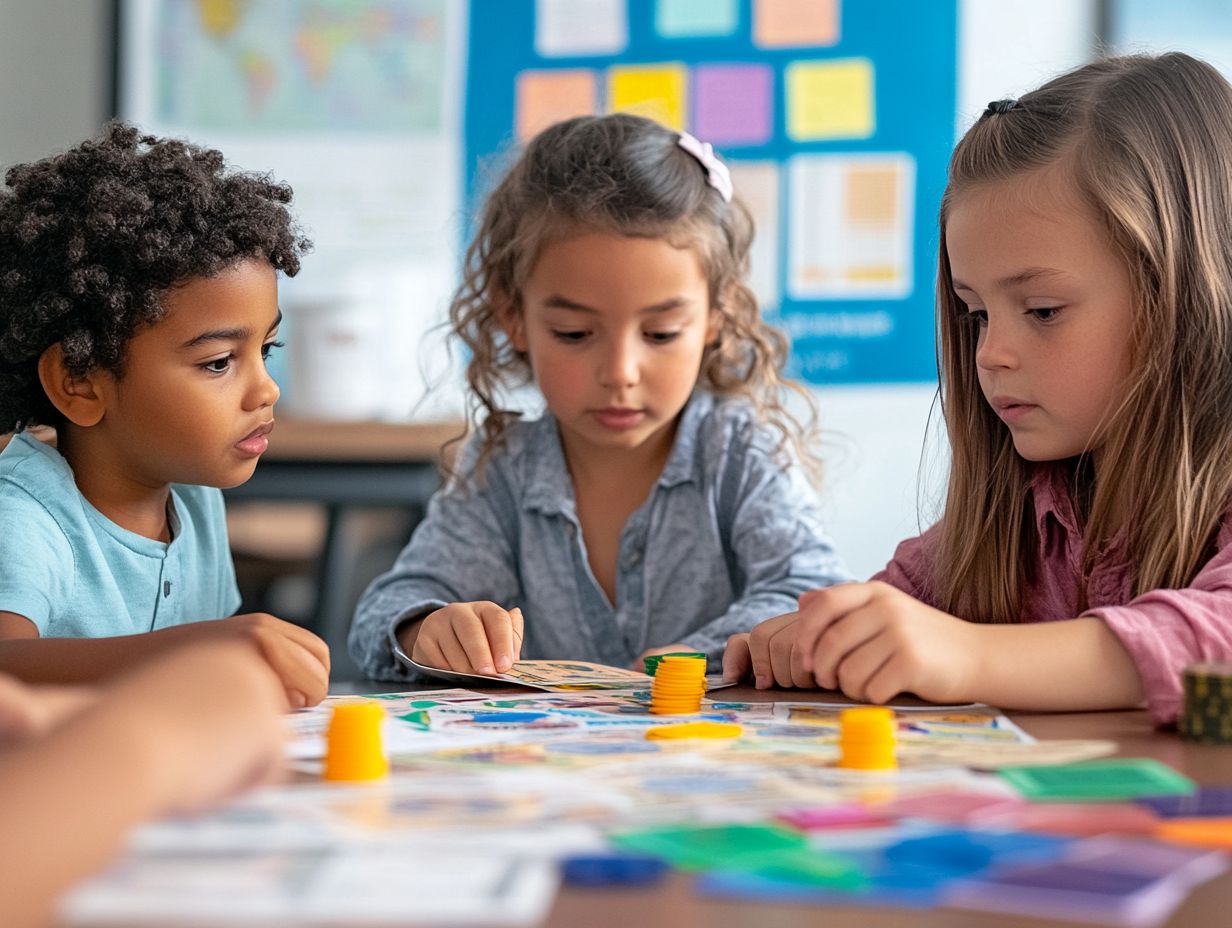
Volunteering at non-profit organizations offers kids hands-on experiences that reinforce the values of giving back and financial responsibility.
When children participate in community service, they learn to care for others and learn about social issues, while also gaining important skills in managing money.
Engaging in various charitable activities exposes them to the importance of budgeting resources, whether it’s time, money, or supplies, illustrating how each decision impacts the community’s well-being.
By witnessing the direct effects of financial contributions and donations, they learn about the needs within their own neighborhoods which can instill a sense of accountability.
Combining community service with learning about finances teaches kids to make wise choices, resulting in responsible individuals who appreciate helping others and manage resources effectively.
3. Participating in Fundraisers
Participating in fundraisers allows kids to actively engage with their community while learning financial concepts such as budgeting and planning.
Through these hands-on experiences, children can grasp the significance of financial education as they are tasked with managing resources effectively to achieve their fundraising goals.
They learn how to set realistic targets, allocate funds wisely, and consider the overall impact of their efforts on the community. This practical approach teaches important financial skills and encourages responsibility and cooperation.
By seeing how their work makes a difference, they learn more about being involved in the community, which makes them more caring and aware of what society needs.
4. Creating a Giving Plan
Creating a giving plan helps kids understand the importance of budgeting for charitable donations while learning effective money management skills.
This method shows them how to set aside part of their pocket money or income for causes they care about, helping them to develop empathy and responsibility.
By participating in financial learning, children can learn how to manage their spending, saving, and donating, which is important for their financial skills as they grow up.
As they see the good results of their efforts, they learn how money can help communities and make a change, teaching them principles that will shape their financial choices throughout their lives.
5. Encouraging Children to Save and Donate Money
Teaching kids to save and donate money helps them make thoughtful choices about finances and supports the idea of giving to charity.
By teaching financial basics early, parents can help children learn to save part of their allowance or gifts and contribute to causes they care about.
Engaging children in discussions about wants versus needs can help them grasp the trade-offs involved when allocating their resources. Talking about giving to charity can help kids feel empathy and understand their part in the community. It shows them how their actions can positively affect other people’s lives.
The Impact of Giving Back on Children’s Financial Habits
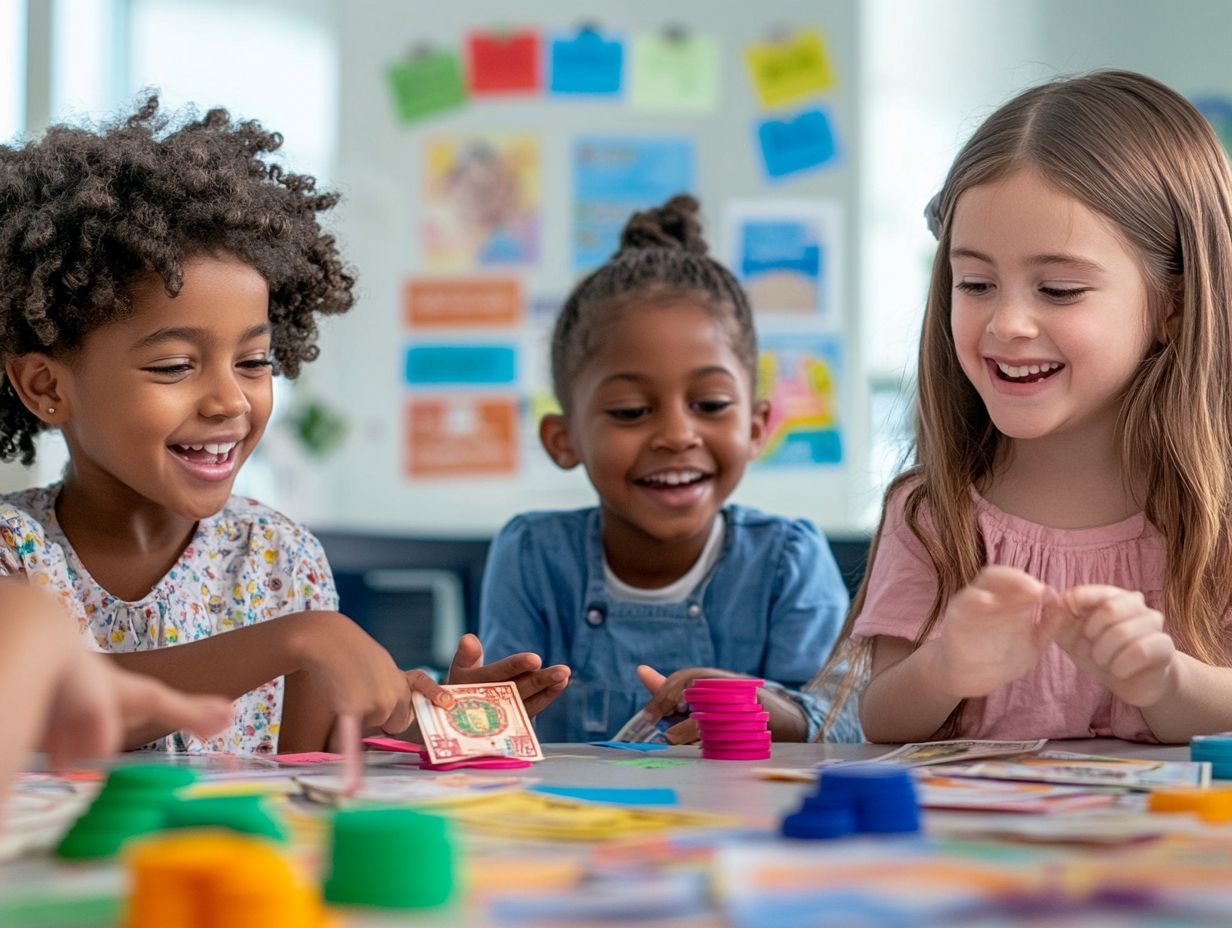
Donating and helping others can greatly influence how children think about money, encouraging them to manage their finances responsibly.
How Does Giving Back Affect Children’s Attitudes Towards Money?
Giving back significantly affects children’s attitudes towards money by instilling a sense of empathy and responsibility in their financial decisions.
When children engage in acts of charity or community service, they begin to understand the value of money beyond mere personal gain. This experience can provide a deeper view on wealth and its impact on society.
It encourages young individuals to consider their financial choices and how those choices can impact others. Such experiences serve as important financial education opportunities, teaching them about budgeting and resource allocation. To further enhance these skills, incorporating structured approaches like teaching kids to save with various concepts and techniques can be beneficial.
As they learn to prioritize giving alongside saving and spending, they also develop essential money management skills that prepare them for a balanced relationship with finances in adulthood.
What Are the Long-Term Effects of Teaching Children to Give Back?
The long-term effects of teaching children to give back can lead to the development of positive financial habits and responsible kids who understand the importance of community involvement.
Teaching children to be generous and to help others from a young age allows them to learn about money in real-world situations and also grow to care for and be accountable to others.
As they grow up, this knowledge often results in thoughtful spending, saving, and investing habits, helping them make good financial decisions as adults.
Children involved in charity activities often become adults who care for their community, developing a helpful habit that benefits all.
This method encourages people to reflect on their needs and think about others’ well-being, enabling them to make a positive impact in their communities.
The Role of Parents and Educators in Teaching Children About Giving Back
Parents and educators are important in teaching children about giving back, offering advice and tools for good financial education. A crucial aspect of this education is helping children understand the importance of budgeting and financial planning. For those looking for comprehensive resources, explore our guide on teaching kids to budget, which offers valuable insights for both parents and teachers.
How Can Parents Teach Their Children About Giving Back Through Financial Lessons?
Parents can teach their children about money by showing how to manage it wisely and getting them involved in helping others through charity work.
Teaching kids about giving helps them learn empathy and the effects of being generous. Talking with children about why helping others is important builds a sense of community and teaches them about managing money.
Activities such as organizing a family fundraiser or volunteering at local shelters provide hands-on experience in budgeting and resource allocation. Teaching children to set aside part of their pocket money for charity can develop lifelong habits of managing money wisely and remind them that supporting others also benefits them.
What Strategies Can Educators Use to Teach Children about Giving Back?
Educators can employ various strategies to teach children about giving back, enhancing their financial education through engaging and practical experiences.
One effective method involves the integration of community service projects into classroom activities, allowing students to experience the impact of their contributions firsthand.
Students grow their ability to understand and care for others and learn how to work with others and manage projects by participating in fundraising activities or helping at nearby shelters.
Educators can facilitate discussions about financial responsibility and philanthropy, encouraging students to consider how their skills and resources can benefit their communities.
This method makes sure that children learn values of kindness and social duty, helping them become well-rounded people who know how important it is to contribute to the community.

Neale Godfrey is the financial voice for women and multi-generations and a world-renowned speaker and author, who has inspired millions through her work. She motivates, trains, educates, and frankly, entertains by delivering her core message: Empower yourself to take control of your financial life.


